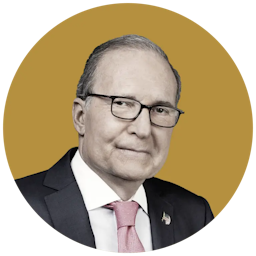Reciprocity, Not Unfair Free Trade, Is Trump’s End Goal on Tariffs
The time has long passed where America can stand by and do nothing while our foreign competitors and adversaries take advantage of us.

Reciprocity is the new free trade. At the Economic Club of Chicago yesterday, Bloomberg moderator John Micklethwait got his clock cleaned by Donald Trump.
Not because he’s a bad person, but because he’s trying to make a free-trade case that is over 25 years old.
I’m not even sure he understands this, but the time has long passed in American politics where the United States can stand by and do nothing while our foreign competitors and adversaries take advantage of us.
The economics profession unfortunately still clings to the kind of post-World War II pure free trade approach whose time is long gone.
With the advent of Communist China joining the World Trade Organization, and the Western powers allowing China’s high tariffs and other trade barriers, while still giving China access to America’s consumer markets, American manufacturing in the Midwest and elsewhere got wiped out.
China’s goods were suddenly cheap, and American goods expensive.
This all really started in the 1970s with cheap Asian products invading America. But it accelerated mightily after the WTO’s Chinese allowances, which today remain unattended.
The numbers are very clear about the decline of manufacturing since 2000 — and, frankly, earlier.
Donald Trump has been completely consistent on this for decades, well before he started running for President.
One of his greatest achievements as president was ringing the warning bell on China’s unfair trading practices, as well as their rampant intellectual property theft and forced transfer of technology.
Again, Mr. Micklethwait could not match wits with Trump, largely because the 45th president’s position is so strong.
Here’s the key: trade reciprocity is the new free trade.
Ironically, the very tariffs that the liberal economic establishment hates so much are the pathway to free trade.
The argument is simple. Countries with unfair trading practices will be denied access to the great American market unless they lower their trade barriers. Trump is a master negotiator at this.
And the average American tariff, even after Trump’s first term, is still only about 2 percent. The lowest in the world, by far.
China, India, Brazil, the EU – all have much higher average tariff rates.
Trump, though, has proven through free-trade deals with South Korea, Japan, and the United States Mexico Canada Agreement that he is as fully capable of reducing tariffs as he is raising them.
Those deals brought trade barriers down. Nobody seems to remember that.
Along the way, Trump has taken great care to defend working Americans.
And, in all likelihood, as Trump drives hard bargains with our competitors by using tariffs to negotiate, the worst-case high tariff rates will never actually come to pass.
And, in addition, Trump is willing to provide American companies with a low 15 percent corporate tax rate and 100 percent expensing depreciation for machinery and equipment and research and development to help them get through difficult times.
And, when you combine Trump’s tax cuts with his ambitious plan to deregulate the business sector, roll back government intervention in the economy (also known as “The Musk Commission”), and, of course, once again unlocking what he calls liquid gold, plus a stable King Dollar — you have a phenomenal pro-growth package which will not only create more goods that will reduce prices, but will finally reduce government spending, deficits, and debts as a share of the overall economy.
It’s all part of a dynamic economic plan that liberal economists just fail to understand.
From Mr. Kudlow’s broadcast on Fox Business Network.

